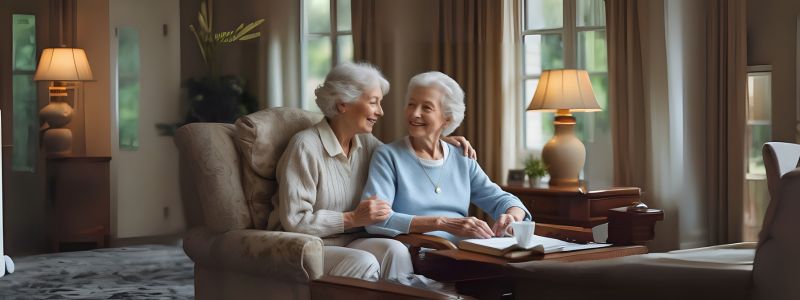
The decision to care for an aging loved one at home can be challenging and emotional. However, companion care and find-care greatly improve the experience for both seniors and families by reducing loneliness, enhancing mental and physical health, and improving overall quality of life.
This article explains the key benefits of having a trusted companion, the range of support services available, important factors in choosing the right companion, cost considerations, comparisons with other care settings, and the activities that foster engagement and well-being. These insights can help you make informed decisions to ensure that aging parents or loved ones live independently and with dignity.
Transitioning into the detailed exploration below, each section offers practical advice and clear data-backed insights on the impact of senior companionship on home care.
Key Benefits of Senior Companionship in Home Care
Senior companionship enhances the experience of aging in place by reducing isolation and improving mental health. Regular interactions with a caring companion make seniors feel valued, boost their mood, and help decrease depressive symptoms significantly.
How Senior Companionship Reduces Loneliness and Social Isolation
Scheduled visits from a senior companion provide regular social interaction, reducing feelings of loneliness. Studies indicate that seniors engaging in frequent social activities are significantly less likely to feel isolated. This ongoing engagement also encourages participation in community activities, extending the benefits beyond the home.
Ways Companionship Improves Mental Health for Seniors
Regular interaction with a compassionate companion helps combat anxiety and depression. Casual conversations and shared activities not only stimulate cognitive functions and memory but also serve as an early indicator for any behavioral changes that may require attention. This emotional connection supports mental clarity and overall well-being.
How Senior Companionship Enhances Physical Health and Activity
A senior companion promotes physical activity through daily walks, light exercises, and assistance with household tasks. Such engagement can reduce the risks of falls and improve balance while helping manage chronic conditions like arthritis and hypertension, thus fostering a more independent lifestyle.
Impact of Companionship on Overall Quality of Life
Companion care enriches seniors’ daily routines by combining mental, emotional, and physical benefits. This holistic support leads to higher satisfaction in personal relationships and decreased hospitalizations, ultimately contributing to a more fulfilling and secure life at home.
Types of Senior Companionship and Support Services Available

Senior companionship extends beyond social interaction to include a variety of support services. These services are designed to meet both practical and emotional needs, enabling seniors to age in place safely while preserving their independence and dignity.
Role of Conversation and Emotional Support in Companionship
Regular conversation provides essential mental stimulation and emotional stability. Active listening, story-sharing, and discussing current events not only sharpen cognitive abilities but also reduce anxiety and depression by fostering trust and a sense of belonging.
How Companions Assist With Activities of Daily Living (ADLs)
Companions assist with daily tasks like dressing, bathing, grooming, and meal preparation, ensuring safe and independent living. Their help with household tasks also minimizes risks, such as falls or the neglect of personal hygiene.
Transportation and Errand Services Provided by Senior Companions
By helping seniors travel to medical appointments, grocery shopping, or social events, companions bridge the gap between home care and community life. This support reduces stress related to transportation and promotes ongoing community engagement.
Medication Reminders, Meal Preparation, and Light Housekeeping
Companions help manage daily routines by providing medication reminders, preparing nutritious meals, and performing light housekeeping. These practical services not only maintain a safe environment but also ease the burden on family caregivers.
Finding and Choosing the Right Senior Companion for Home Care
Choosing the right senior companion involves assessing the specific needs of the aging adult, ensuring personality compatibility, and verifying professional credentials through background checks and interviews. This careful selection process is vital for maintaining high-quality care and ensuring the senior’s happiness.
Factors to Consider When Assessing Senior Needs and Preferences
Identifying specific needs such as mobility, dietary restrictions, cognitive abilities, and social interests is crucial. A clear understanding of the senior’s daily routine and preferences helps in selecting a companion who can provide tailored support.
Importance of Compatibility in Matching Seniors With Companions
A companion who shares similar interests or communication styles builds a stronger emotional connection, leading to better satisfaction and well-being. Compatibility ensures more meaningful interactions and a harmonious daily routine.
Background Checks and Vetting for Senior Companions
Thorough background checks, which include criminal record reviews, reference verifications, and professional assessments, ensure that the companion has the required skills and adheres to high ethical standards. Comprehensive training further guarantees preparedness for emergencies and proper care.
What to Look for When Interviewing Potential Companions
During interviews, focus on the candidate’s caregiving experience, problem-solving abilities, communication skills, empathy, and flexibility. These qualities are essential to match the specific requirements of the senior and foster a positive caregiving relationship.
How Companion Training and Experience Affect Care Quality
Well-trained and experienced companions are more capable of handling emergencies and adapting to changing care needs. Their advanced skills in communication, conflict resolution, and empathy significantly enhance the overall quality of care.
Costs of Senior Companionship and Budgeting

The cost of senior companionship depends on the level of care, frequency of visits, and location. Understanding these factors allows families to plan their budgets effectively and secure quality care without financial strain.
Factors Influencing the Cost of Senior Companionship Services
Costs vary based on the duration and frequency of visits, special services like medication management, and the companion’s level of experience. Urban areas often have higher rates due to increased living costs, and round-the-clock or specialized care typically commands premium pricing.
Payment Options Available for Senior Companionship
Payment structures may include hourly rates, daily packages, or ongoing service plans. Some agencies offer sliding-scale fees to accommodate varying income levels, and certain services might be covered by Medicare Advantage or long-term care insurance.
How Families Can Budget Effectively for Home Care Companionship
A well-planned care strategy that outlines necessary tasks and expected hours aids in accurate cost estimation. Families should also account for incidental expenses such as transportation. Consulting financial planners who specialize in senior care can further assist in creating a sustainable budget.
Home Care Companionship Compared to Other Senior Care Options
Home care companionship is unique in its ability to provide personalized, in-home support that emphasizes independence. Compared to assisted living or nursing homes, it offers customized care in a familiar environment, though each option has its own set of advantages.
Differences Between Home Care and Assisted Living
Home care provides one-on-one support in a familiar setting, promoting comfort and independence. Assisted living offers structured environments in a community setting, which may be preferred for seniors needing more continuous supervision.
How Home Care Differs From Nursing Homes
Nursing homes deliver intensive medical care in an institutional environment, which can sometimes feel impersonal. In contrast, home care companionship focuses on personalized support, maintaining both dignity and emotional well-being while promoting slower cognitive decline.
When Adult Day Care is a Suitable Alternative to Home Companionship
Adult day care centers offer daytime supervision, social interaction, meals, and basic assistance. They serve as a cost-effective supplement for seniors who may not need round-the-clock support but still benefit from structured daytime activities.
Activities and Engagement Opportunities Provided by Senior Companions

Senior companions enhance quality of life by engaging seniors in varied activities that stimulate both the mind and body. These activities range from hobbies to exercise programs, fostering a vibrant and enriching daily routine.
Hobbies and Interests Companions Can Support
Companions can encourage hobbies such as reading, gardening, painting, or board games, which help maintain cognitive function and reduce stress. Pursuing these interests contributes to renewed enthusiasm and mental stimulation.
How Social Activities and Outings Benefit Seniors
Regular outings and participation in community events help reduce feelings of loneliness and promote better cardiovascular health. Such social interactions build broader social networks and support emotional resilience.
Mental Stimulation and Physical Exercise Programs Offered
Companions often design programs combining gentle physical exercises with cognitive games. Whether it’s light stretching, puzzles, or chair yoga, these activities aim to improve balance, flexibility, and neural connectivity, all of which are essential for healthy aging.
Senior Companionship Tailored for Seniors With Specific Conditions
Companion care is adaptable to meet the unique needs of seniors with specific conditions. Whether addressing dementia, mobility issues, or post-surgery recovery, tailored companionship ensures focused support for improved outcomes.
Companionship Services Supporting Seniors With Alzheimer’s and Dementia
For seniors with Alzheimer’s or dementia, companions provide a calm, structured environment that reduces disorientation. Specialized training and memory-stimulating activities are integrated with daily routines to improve familiarity and reduce agitation.
How Mobility Issues Are Addressed Through Companionship
Dedicated companions support safe movement and assist with physical therapy exercises, helping prevent falls and encouraging gentle, regular exercise. Continuous monitoring and the use of supportive devices ensure that any changes in mobility are promptly addressed.
Role of Companionship in Recovery From Illness or Surgery
During recovery, a companion monitors vital signs, ensures adherence to medication schedules, and assists with rehabilitation exercises. This structured and supportive approach helps shorten recovery times and provides the emotional support necessary for a quicker return to normalcy.
Table: Comparison of Senior Care Options
Before examining further activity and engagement examples, consider the following table that compares key features of senior companionship, assisted living, and nursing homes:
| Feature | Home Care Companionship | Assisted Living | Nursing Homes |
|---|---|---|---|
| Independence | Highest – seniors remain at home | Moderate – cleaner community environment | Lowest – institutional, controlled environment |
| Personalized Care | Highly customized one-on-one support | Standardized support across multiple residents | Medical, round-the-clock care focus |
| Emotional Engagement | Continuous personal relationship | Regular group activities, less individual focus | Limited due to institutional settings |
| Physical Environment | Familiar home setting | Designed environments with communal living | Clinical settings with extensive medical facilities |
| Cost Variability | Flexible packages based on hours and needs | Fixed rate with community amenities | Higher rates owing to comprehensive medical care |
The table shows that while each option has distinct strengths, home care companionship excels in offering personalized care and emotional support.
After reviewing this comparison, it is clear why many families choose home care companionship to preserve independence while providing compassionate and individualized care.
Frequently Asked Questions
How can senior companionship help reduce feelings of loneliness?
Companion care provides regular social interaction and emotional support, significantly improving mental health and fostering a sense of belonging.
What types of tasks can a senior companion assist with during home care?
Companions assist with daily tasks such as bathing, dressing, meal preparation, medication reminders, light housekeeping, transportation, and errands, all of which help seniors remain independent.
How is the cost of senior companionship determined?
Costs depend on the frequency and duration of visits, the level of specialized care, and geographic location. Payment may be structured hourly, daily, or via service packages, with options for insurance support.
What should I consider when choosing a senior companion?
Look for experience, personality compatibility, communication skills, and flexibility. Ensure the companion has undergone background checks and thorough training to meet your senior’s specific needs.
How does companionship care differ from other senior care options?
Unlike assisted living or nursing homes, companionship care takes place in the senior’s home, emphasizing personalized, one-on-one, and familiar support that promotes independence and emotional well-being.
Can companions assist in managing chronic health conditions?
Yes, they help with medication reminders, monitoring health changes, and ensuring adherence to treatment plans, which is critical for managing chronic conditions.
Is senior companionship a long-term care solution?
It can be both short-term and long-term, serving as temporary support during recovery or ongoing assistance to enhance quality of life and maintain independence.
Final Thoughts
Companion care at home offers a transformative approach that addresses both practical daily needs and emotional well-being. By reducing isolation, boosting mental and physical health, and preserving independence, senior companionship is a valuable service. For families exploring home care options, careful research and selecting a compatible companion are key to ensuring quality, personalized care that helps loved ones live independently and with dignity.

